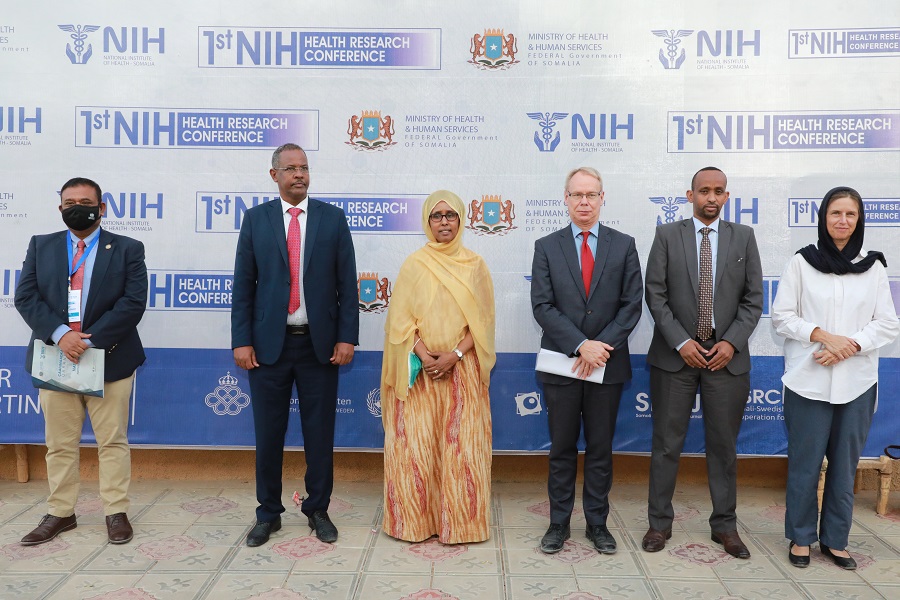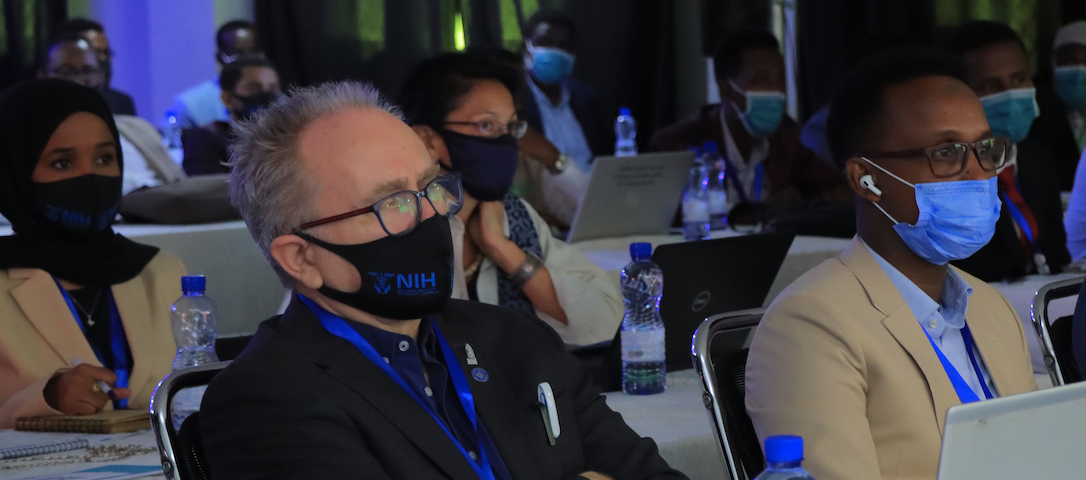The COVID-19 pandemic has unveiled the importance of speedy and robust research in the field of health. While biomedical research has been critical to the response – the rapid development of vaccines, for example – equally important is research into the wider health systems and how to ensure people have access to new and existing technologies.
To that end, in Somalia many partners, including the Alliance, have been working to support greater capacity for health systems research. The aim is to support the Federal Government of Somalia to use new knowledge and evidence from researchers to set priorities for the country.
A key milestone was the first ever health research conference, held in Garowe, Puntland, Somalia, between 30 January and 1 February 2022. The conference was convened by the Federal Ministry of Health and Human Services and National Institute of Health (NIH) and brought together 200 national and international researchers to present 51 research abstracts that showcased new evidence and best practices in public health in Somalia. Of the 51 researchers presenting, seven are female.

High-level dignitaries, including both the Federal and Puntland's Health Ministers with the WHO Representative, Ambassador of Sweden and NIH Executive Director, attended the research conference. Credit: WHO/Mukhtar
HE Dr Fawziya Abikar Nur, Minister of Health and Human Services for Somalia, addressed the conference and encouraged researchers “to document these national efforts ─ both what works and what does not work and why ─ but, above all, provide us solutions that can address the challenges we face”.
Other dignitaries who participated in the conference included HE Dr Jama Farah Hassan, Minister of Health, Puntland; HE Per Lindgarde, Ambassador of Sweden to Somalia; Dr Mamunur Rahman Malik, WHO Representative to Somalia and Head of Mission; representatives from the Swedish International Development Cooperation Agency (SIDA) and the Public Health Agency of Sweden (PHAS); and representatives from the African Field Epidemiology Network (AFENET).
Researchers presented their abstracts on six themes:
- health systems
- health research production and dissemination
- reproductive, maternal, newborn, child and adolescent health
- communicable diseases
- noncommunicable diseases
- research training and capacity building, linking research to action
Presenters also stimulated discussions around strengthening pharmacovigilance and drug regulation; increasing and motivating human resources for health; improving access to health care for women; and providing compassionate care while maintaining dignity and the privacy of female patients. They discussed how to reduce the negative effects of female genital mutilation (FGM); and recruiting assistant community-based midwives to improve maternal health care in rural areas.
Furthermore, they deliberated over how to address the high burden of multi-drug resistant tuberculosis in Somalia, and the need to deploy community health workers to enhance early detection of the disease, in addition to exploring the linkages between Sustainable Development Goals (SDGs) in Somalia, with a focus on health, among other topics.

Participants in the research conference listen to presentations. Credit: WHO/Mukhtar
During the conference, the Chair of the Board of Directors of the NIH launched the Somali Health Action Journal (SHAJ). This is the first Somali health journal that will receive articles, facilitate their review by peers, motivate Somalis to conduct further research, write and publish new articles, and take up opportunities to disseminate and use research for policy-making and the design of useful programmes. The SHAJ editors also committed to supporting young Somali researchers by mentoring them where possible.
On behalf of the NIH, the public health specialist and focal person for research at the NIH, Dr Mukhtar Bulale explained that the sessions were successful and led to rich discussions with questions being answered, which was a flagship symbol illustrating useful nationally owned health research.
He stated:
Even though we started small, this conference has put Somalia on the global research map. Seeing young researchers put their best foot forward has given us immense hope that Somalia’s health research development is undergoing a recovery phase. We saw at the conference a unity of purpose, solidarity and eagerness for research partnerships and solutions to challenges. I urge stakeholders to ensure we do not miss the opportunity to support these young, dynamic researchers.
At the end of the conference, the Federal Ministry of Health, NIH, and stakeholders advocated for sustained investment in health research and in the implementation of the Essential Package of Health Services 2020, which would benefit the Somali population. They also resolved to promote health system research, linking it to public policy formulation, while ensuring it focuses on addressing existing barriers to health service delivery. Together, they also committed to foster cooperation between the public and private sector in health system research, and to promote the development of innovative technologies and approaches. The partners resolved to strengthen the links between evidence generation and the implementation of primary health care, while calling on all national and international stakeholders to develop the capacity of learning institutions in the country and to facilitate high-quality research in the country.
